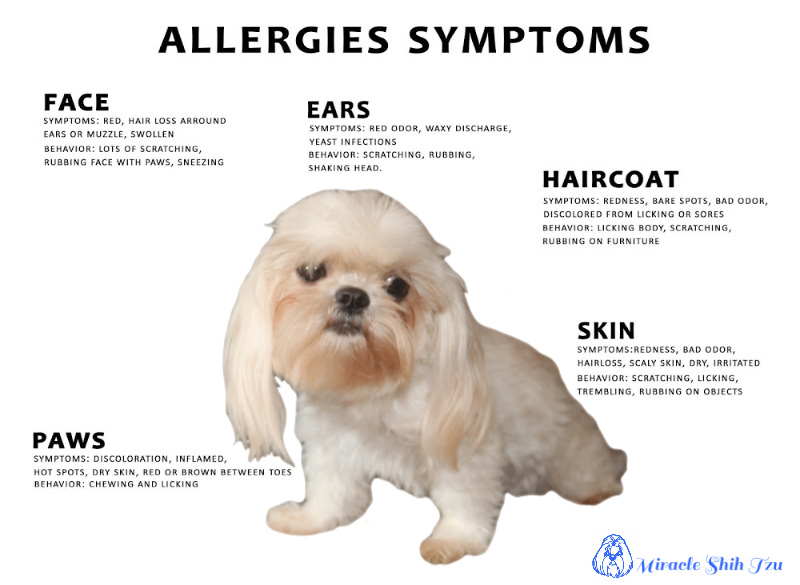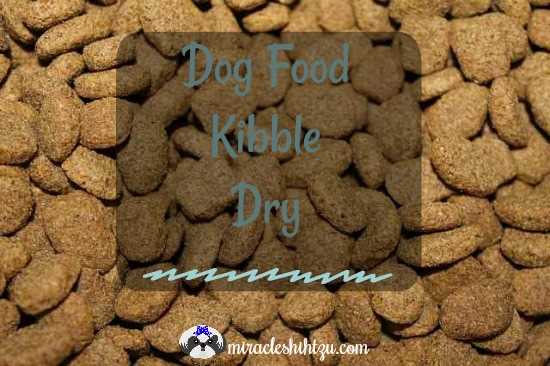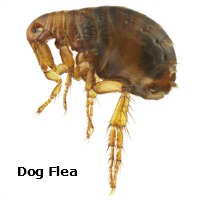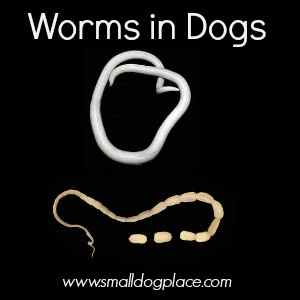What to Do About Your Shih Tzu Itchy Skin
Shih Tzu Itchy Skin By Janice A. Jones M.A. |Last Updated 04-18-2023
Is your Shih Tzu dog, scratching?
Any itchy dog concerns me. Why? Because, the poor pooch looks miserable, scratching, biting at his skin, jerking and then back to scratching again. What could possibly be causing such distress? If this sounds like your Shih Tzu, you are not alone. The breed is prone to a number of problems that cause itching or as veterinarians would say, pruritus.
In this article, we will explore the reasons why Shih Tzu dogs scratch and the most common ways to make them feel better soon.
 Shih Tzu Itchy Skin
Shih Tzu Itchy SkinReasons For Your Shih Tzu Itchy Skin
Common Causes of Shih Tzu Itchy Skin
- Allergies to Food, Environmental such as shampoos or grass (more about that in a moment and Parasites
- Infections
- Dry Skin - Dry Air
- Insect Bites and stings such as Chiggers, mites, Lice, and Tick Bites, bees, wasps and hornets
Less Common
- Lymphoma which is a skin cancer in dogs
- Skin Fold Pyoderma which is the inflammation of the skin between skin folds and can be seen in dogs such as bulldogs with lots of skin folds
- Hypothyroidism can cause seborrhea which is itchy
- Anxiety and Stress
- Drug Reactions

In this Shih Tzu Itchy Skin article, we will be discussing just the most common types of Shih Tzu Itchy Skin
Click on each area to find what you need immediately or continue to scroll to read the entire article. If you would like to tell us about your Shih Tzu itchy skin, there is a form at the end of this article. If you have specific questions, I would be glad to answer them, but remember, I am not a veterinarian and will likely refer you to one if your concern is of a medical nature.
Allergies
- Food Allergies
- Environmental Allergies Atopic Dermatitis Contact Dermatitis
- Allergies to Fleas
Skin Infections
- Fungal Infections
Dry Skin Due to Dry Air
Insects
- Mites
- Walking Dandruff
- Chiggers
Shih Tzu Itchy Skin Due to Food Allergies

Food allergies are quite common in dogs because there are many ingredients that are used in dog food that dogs do not need. Furthermore, it might not be the dog food that you are using at all, but the dog treats, chews, flavored toys, or even toothpaste that the dog eats regularly.
Poor quality foods will be more likely to add other items such as artificial colors and flavoring. Chemical preservatives can also be a big problem.
The problem lies in the lower quality foods that include filler ingredients such as corn, wheat, soy, and oats. These fillers make it possible for their manufacturers to sell the dog food cheaply but they do not provide any nutritional value. Though many blame the problem entirely on these grain sources, it is often the protein source in the food that is the actual culprit such as beef. Some dogs are even sensitive to chicken, a common protein source found in many puppy foods.
The best way to find out if the dog is allergic to a specific ingredient is by eliminating everything but one item and then adding ingredients gradually. This method relies on a home cooked diet which may not be practical for all pet owners.
Did You Know...
According to the AKC, five of the most common allergies in dogs are beef, dairy, wheat, chicken and egg.
Alternatively,
your veterinarian may be able to prescribe a more hypoallergenic diet that uses
unusual protein and carbohydrate sources that the dog has not encountered
before such as fish and potatoes.
Or you may decide the best way to go is to cook for your dog. There is much to be said for homemade dog food, but always consult with a veterinary nutritionist before doing this. Without the necessary minerals and vitamins in the correct ratios, you can be subjecting your dog to nutritional deficiencies that can cause other problems down the road.
Simple Things to Try at Home For Food Allergies
You will want to work with your vet if you suspect a food allergy, but while you're waiting for your appointment date, here are a couple of things you can try at home.
- Learn to read the dog food label of your current food. What is the primary protein source. It should be a named meat or fish such as Chicken, Turkey or Salmon. (No byproducts.)
- Be sure you aren't giving your dog something he shouldn't have. There are some human foods dogs should not eat. (Make sure no one in your family is guilty of unknowingly giving your Shih Tzu toxic foods.
- Do not immediately switch to a grain-free dog food because you've heard grains are bad. There are some concerns about grain free dog food you should know about.
- Consider other primary protein sourced foods, called novel proteins. Examples are Duck, Bison, Rabbit, Salmon, Venison, Herring, Kangaroo, Quail and Ostrich. Now, Kangaroo seems rather exotic to an American breeder like myself, but I will tell you that one of my puppy buyers uses it will great success.
- There are many healthy grains used in dog food. Look for whole grains such as oats, brown rice, barley, millet, and quinoa.
- Start an elimination diet if you think food is the problem. Do this with your veterinarian's instructions.
If you think that corn, wheat or soy is causing problems, consider a food that does not contain those products. Contrary to what you may have heard, dogs are not obligate carnivores. The dog is an indifferent omnivore.
Over the course of time, dogs gained the ability to utilize starch 28 times more efficiently than wolves through the AMY2B gene. This change occurred roughly at the time people switched to an agricultural life style
Shih Tzu Itchy Skin Due to Environmental Allergies
Shih Tzu Itchy Skin Due to Atopic Dermatitis
Another type of allergy that causes dog scratching is caused by something found in the dog’s environment. Canine atopic dermatitis occurs when a dog becomes overly sensitive to something within his environment. This inherited tendency to develop IgE antibodies in response to an allergen is very common in the Shih Tzu breed.
These allergens, or anything that causes an allergy or hypersensitivity reaction, could be a variety of things found in the dog’s environment such as plant pollen, molds, dust, and grasses, chemical residues on blankets and bedding, and cleaning chemicals.
They often begin in young dogs around Autumn and spreads into spring and summer and before long, it is no longer seasonal, but year round. Shih Tzu dogs with this problem will scratch, but may also start rubbing their face, sneezing and licking their paws. (Thus the brown stains on the paws).
This type of allergy needs veterinary intervention.
Your veterinary may run allergy tests. They may also prescribe antihistamines or steroids such as prednisone to be taken by mouth. Special hydro-cortisone based shampoos also offer some relief. Sometimes allergy shots are used.
If allergy testing is suggested it will be done by a skin test or a blood test. Once the allergic culprit is identified, the dog will receive a series of desensitizing allergy shots. This can be a very long drawn out process.
Often the symptoms become worse before they get better during this desensitizing process because the injections include a small amount of the very allergen that the dog is allergic to.
When scratching becomes severe, a secondary bacterial infection might occur which needs to be treated with antibiotic injections or pills.
Shih Tzu Itchy Skin Due to Contact Dermatitis
Irritant and allergic contact dermatitis is also common in Shih Tzu dogs. It occurs when the dog comes into contact with a chemical or other irritant and produce itchy red bumps and inflammation.
Any kind of chemicals can be the causes such as soaps, detergents, even certain carpet dyes or wood preservatives. Sometimes the problem allergen is chemicals found in plastic food dishes. Other times, the dog is allergic to the chemicals in flea collars and products.
Rule Out the Obvious Culprit
What You Can Do: Step 1
With either Contact or Atopic dermatitis, you will first want to consult your vet. While you are waiting for your appointment, try to jot down everything your dog came in contact with since the problem began. Yes, I know, this is not going to be easy, but it will pay off in the long run.
- Did you change dog shampoo? Conditioner? Other Grooming Supplies?
- Did you change your laundry detergent? Add bleach, softener, or anything else that may be different.
- Did your dog spend time outdoors? On the grass? In the woods? Sand/beach? Other?
- Did you shampoo your carpet? Or get new carpeting? No rugs or other type of flooring?
- Did you change out dog bowls? Potty Pads, New Dog bedding, New Dog Toys?
- Did you paint or do some other form of home repair?
- Did you spray your lawn for pests, fertilize, etc?
- Was another animal introduced into your home? Dog, Cat, Etc.
- Are you using a new cleaning product? Disinfectant? Deodorizer? Enzyme Cleaner?
- Anything else you can think of that has changed? New groomer, a dog walker that smokes?
Simple Things to Try at Home
Things You Can Try: Step 2
- Try a Hypoallergenic mild shampoo. I personally like Colloidal Oatmeal Dog Shampoo. It contains lavender essential oils that seems to calm the dog and is safe on puppies.
- Vacuum home thoroughly using a vacuum designed for pets with a HEPA filter. A Favorite all time vacuum is the Shark Navigator. Purchase extra filters so you won't run out. My second favorite is the Shark Rotator. It has a longer cord but is slightly more expensive.
- Wash bedding, blankets and soft toys in a mild detergent. Tide PurClean is a good choice for all your laundry not just dog laundry. No dyes, chlorine, phosphates or optical brighteners.
- Shampoo rugs using a pet-friendly rug shampoo. I love the Nature's Miracle Products and you'll likely see gallons of it lying around if you visit me, but I was happy to find they also make a carpet shampoo. Very nice scent and it works just like their other enzyme cleaners. It is called Nature's Miracle Tropical Bloom.
Shih Tzu Itchy Skin Due to Allergies Caused by Fleas

Technically, allergies caused by fleas can be considered an environmental issues, I have given it a separate category because it is so common, especially in areas where there is a high incidence of fleas.
Fleas are an extremely common cause of dog scratching. Fleas on dogs can be very stressful and if the dog has a hypersensitivity to fleas it does not take a major infestation for the dog to be miserably. In fact one flea can cause tremendous discomfort.
If you find out your dog does have this hypersensitivity, you will need to make sure he is on flea control year round.
To rule out fleas, you will need to inspect your dog’s skin carefully. Fleas are tiny brown insects that live on the skin and coat of an animal during the adult phase of their life cycle.
Fleas particularly like the abdominal area, base of the tail and the inner thighs. They jump from place to place and sometimes it’s easier to find their presence by the excrement they leave, tiny brown/black specks that resemble coarse black pepper.
If you find fleas, you will need to treat the dog as well as where the dog lives including the entire house if the dog has access to it.
Additional antihistamines or steroids may be prescribed by your veterinarian to assist with the hypersensitivity. If a secondary bacterial infection develops, your veterinarian may also prescribe some type of antibiotic.
Simple Things to Try at Home for Fleas
Things To Do At Home
- Inspect for fleas or other external parasites and treat to eliminate them.
- Treat the environment if fleas are suspected
Please visit my article on Dog Fleas for product and treatment suggestions.
Shih Tzu Itchy Skin Due to Skin Infections
Normally skin infections are secondary to other problems but they can be primary also. Pyoderma is a term used to describe bacterial infections, the most common being Hot Spots.
Hot Spots or acute moist dermatitis is often seasonal normally worse in the hot humid months of summer. These red, hot, moist patches often appear quickly and can be itchy and painful. Normally there is hair loss around and over the area.
Shih Tzu Itchy Skin Due to Fungal Infections- Ringworm
The most common type of a fungal skin infection is ringworm. Contrary to popular believe, ringworm is not caused by a worm, but a microscopic fungal organism that invades the dead outer layers of skin.
It gets its name because most infections resemble circular or ring shaped patches of hair loss and redness. Ringworm can also occur without accompanying itchiness. Ringworm is more common in cats than in dogs,
Ringworm is normally not itchy, but when it is accompanied by a secondary bacterial infection, that is when the itching begins.
Veterinarians can differentiate this infection from others by the use of an ultraviolet light called a Woods light. The skin will fluoresce green. Also, a fungal culture might be done. Your vet will treat it with a topical anti-fungal. They may also prescribe other anti-fungal drugs to be taken by mouth.
The environment will also need to be treated. Discard the dog's bedding, sterilize any grooming equipment with a 1:10 dilution of bleach and vacuum carpet weekly. Always wash your hands to prevent cross-contamination.
Shih Tzu Itchy Skin Due to Dry Skin & Dry Environmental Air
Dogs also can suffer from dry skin causing them to itch and lick their skin.
You might also see dandruff and a dull, lack luster coat. Some of the most common reasons for dry skin include a poor diet, a poor shampoo, or possibly bathing too often or poor grooming.
Is your dog scratching only during one part of the year? Dry winter weather and fatty acid deficiencies can also cause dry skin in dogs. That dry skin leads to scratching.
You can always tell when you have a home that is very dry because static electricity will build up and you'll have that typical fly away hair response when you brush your dog. Spray conditioner will help with this problem and improve the moisture in your dog's coat at the same time.
Shih Tzu Itchy Skin Treatment Options for Dry Air/Dry Skin
- Increase the humidity in the air
- Use a high quality shampoo
- Add Fatty Acids into the Diet
The best way to reduce the chance that your dog will scratch because of dry air is to increase the amount of moisture in your home. It would benefit you as well. You can do this by adding a cool mist humidifier to rooms where your dog is likely to sleep and play. All humidifiers come with a filter that needs to be cleaned or replaced periodically.
If it is impractical to use humidifiers, you can increase the moisture in the air by leaving containers of water out, adding houseplants, add some steam via a teapot or run a hot shower.
Dry Skin Due to Over-bathing or Using Poor Shampoos
As long as you are using a high quality dog shampoo, you should be able to bathe your dog several times a month. Poor quality shampoos can dry out the coat leading to Shih Tzu itchy skin. Human shampoo should not be used on dogs and that does include baby shampoo.
High quality conditioners also help increase moisture into the coat and will help keep your dog's skin from drying out. Always use a conditioning spray mist before brushing or combing your Shih Tzu's hair.
Add Omega 3 Omega 6 Fatty Acids to the Diet
The addition of Omega 3 and Omega 6 fatty acids may help prevent dry skin.
A good choice for a Shih Tzu is Salmon Oil. I do not use Salmon oil year round, but wintertime it is almost mandatory.
There are many good choices on the market but my favorite is Grizzly Salmon Oil.
A few squirts on their food several times a week, and all the dry flaky hair is gone. You can purchase this product from Amazon, directly from this site. Click the link to the right.

Shih Tzu Itchy Skin Due to Insect Bites and Stings: Chiggers, Mites, Lice, Ticks, Bees, Wasps and Hornets
As mentioned above, one the the most common allergy is due to a parasite such as the flea. But fleas are not the only external parasite that affects dogs and causes itchy skin, inflammation and infections. Other insects can cause massive problems. Insect stings such as Bee Stings can be painful but they may also cause your dog to scratch.
Mites-Sarcoptic ~ Demodex ~Ear Mites ~ Cheyletiella Mange
Mites contribute to two types of mange problems, sarcoptic (scabies) and demodicosis. Demodicosis is caused by the demodex mite and also causes skin sores and hair loss.
Mites are too small to be seen by the naked eye so diagnosis of this problem will need to be made by a veterinarian. The vet will take a scrapping of skin with the side of a scalpel and view it under the microscope. Treatment can be lengthy.
Shih Tzu Itchy Skin Due to Ear Mites
Ear mites are another story. If the dog is only scratching his ears, ear problems could be the cause. Infections and ear mites can be treated successfully by a veterinarian.
To rule this out, check inside the dog’s ear. The ear should be clean and slightly pink, the color of skin. If there is redness, bleeding, or a brown discharge with a bad odor, ear mites and/or infection is the likely reason. Both ear mites and ear infections are likely to cause itching. The only way to know if the problem is due to ear mites, is to view the mites with an otoscope or to view them under magnification. If you have an otoscope, you can see them as white specks surrounded by black debris.
A veterinary will be able to rule out mites and treat them along with the secondary infection. That might take care of your dog scratching.
If he is scratching in other areas, it is likely not caused by ear mites. Do you see your dog scratching on his whole body or is it localized itch in one spot?
Home Care for Ear Mites
1. Keep ears clean, Here is an Ear Mite Treatment. that you can purchase over-the-counter
2. Administer ear mite medication per Vet's instruction.
Shih Tzu Itchy Skin Due to Cheyletiella Mange (A.K.A. Walking Dandruff)
Thankfully, this is not as common as it once was but when it occurs it is highly contagious and often affects young puppies. Cheyletiella mites live in straw and other types of bedding that is often not used nowadays. They cause a red bumpy rash and flaky skin. It is caused walking dandruff because the skin flakes resemble dandruff. The moving "dandruff" is actually the mites moving around under the skin flakes. They are mostly seen on the neck and along the back of a puppy.
The Cheyletiella mite can also infect people so every animal in the household will need to be treated. Check with your vet for the proper treatment protocol.
Shih Tzu Itchy Skin Due to Chiggers
In some locales, they are called harvest mites or red bugs but regardless of what you call them, the itching can be severe. These insects live as adults in decaying vegetation and reproduce in late summer or early fall. If a dog is out in a wooded area around that time, they can pick up the infestation.
They look like tiny red, yellow or orange specs, and often congregate between toes, ears or near the mouth. The larval form suck on the skin which causes sores, scabs and intense itching. The best way to prevent Chiggers is to keep your dog out of wooded areas during Chigger season.
You may be able to treat at home with a lime-sulfur dip but you will probably want to consult your vet for something to relieve the itching.
Treatment for Shih Tzu Itchy Skin from Your Vet
A veterinary exam is required to determine the source of the itching.
The veterinarian will then prescribe medications to relieve the itching and other treatment options such as injections or antibiotics to treat any skin infections.
Because of the differing opinions as to the cause of this serious skin irritation problem, there are many different treatments prescribed by veterinarians.
Prednisone, a steroid may temporally relieve the itch and inflammation. It is not a long term solution.
Antihistamines may be used as an alternative. Antibiotics are usually prescribed when infection is suspected.
If the cause of the itchy skin is something other than allergies, dry skin or infections, the reason must be found. Cancer and hormonal imbalances must be ruled out by your veterinarian.
References for Shih Tzu Itchy Skin
Diet adaptation in dog reflects spread of prehistoric agriculture in Heredity(2016) 117, 301–306 Official journal of the Genetics Society
Dog Owner's Home Veterinary Handbook 4th Edition Wiley Publishing, Inc.
Common Diseases of Companion Animals 4th Edition Elsevier
If You Found Shih Tzu Itchy Skin Helpful, May I Suggest a couple more articles?



"Hi, I'm Janice Jones, a former veterinary technician and Shih Tzu expert with over 40 years of experience with the breed. Through Miracle Shih Tzu, I combine my medical background and extensive breed knowledge to provide reliable, practical advice for Shih Tzu owners. My mission is to help you give your Shih Tzu the happiest, healthiest life possible through evidence-based information and real-world solutions. Whether you're new to the breed or a seasoned owner, you'll find trusted guidance here for all aspects of Shih Tzu care.
I hold an undergraduate degree in Psychology with a minor in biology, Early Childhood Education, and Nursing, and a Master's in Mental Health Counseling.



